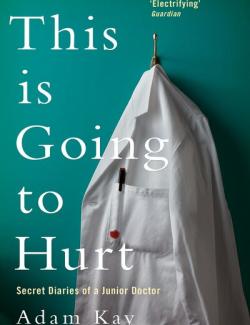This Is Going to Hurt: Secret Diaries of a Junior Doctor / Áóäåò áîëüíî. Èñòîðèÿ âðà÷à, óøåäøåãî èç ïðîôåññèè íà ïèêå êàðüåðû (by Adam Kay, 2017) - àóäèîêíèãà íà àíãëèéñêîì
÷òîáû óáðàòü ðåêëàìó ñäåëàéòå ðåãèñòðàöèþ/àâòîðèçóéòåñü íà ñàéòå

This Is Going to Hurt: Secret Diaries of a Junior Doctor / Áóäåò áîëüíî. Èñòîðèÿ âðà÷à, óøåäøåãî èç ïðîôåññèè íà ïèêå êàðüåðû (by Adam Kay, 2017) - àóäèîêíèãà íà àíãëèéñêîì
Àäàì Êåé âûïîëíÿë ñâîè îáÿçàííîñòè âðà÷à íà ïðîòÿæåíèè øåñòè ëåò. Ïîðîé æèçíü è ðàáîòà ñìåøèâàëèñü âîåäèíî, ïðåâðàùàÿñü â ðóòèíó. Íî îäèí ñëó÷àé èçìåíèë îòíîøåíèå Àäàìà ê ïðîèñõîäÿùåìó âîêðóã. Îí çàâåë äíåâíèê, ÷òîáû çàïèñûâàòü âñå êîìè÷åñêèå ñèòóàöèè, óäèâèòåëüíûå ñîáûòèÿ èç ñâîåé ïðàêòèêè. Ýòî ïî-íàñòîÿùåìó ñìåøíàÿ êîëëåêöèÿ èñòîðèé îò áûâøåãî âðà÷à. Íåêîòîðûå íàñòîëüêî óæàñíûå, óäèâèòåëüíûå èëè çàáàâíûå, ÷òî ó ÷èòàòåëÿ áóäåò óòðóäíÿòüñÿ äûõàíèå îò ñìåõà è èñïóãà, øîêà èëè îñîçíàíèÿ ðåàëüíîñòè îïèñàííûõ ñîáûòèé. Ýòî íå äëÿ áðåçãëèâûõ, ñåðüåçíûõ ëèö, ñòîèò áûòü ãîòîâûìè ê áîëüøîìó êîëè÷åñòâó êðîâè, ðîäîâ, äóðíûõ ñëîâ è âûñêàçûâàíèé è ðàçëè÷íûõ "îðóäèé", çàñòðÿâøèõ â ìåñòàõ, ãäå îíè äåéñòâèòåëüíî íå äîëæíû áûòü. Êíèãà î áþðîêðàòèè è ñàìîïîæåðòâîâàíèè, î äîëãå è ïðîñòî ðàáîòå. Âïå÷àòëÿþùàÿ ðàáîòà, êîòîðàÿ óäèâèò, íàñìåøèò, è íåìíîãî íàïóãàåò ÷èòàòåëüñêóþ àóäèòîðèþ íåîæèäàííûìè èñòîðèÿìè, êîòîðûå íå äî êîíöà ïîñòèãíåò ñîçíàíèå.
- Ðåéòèíã:
- Ïðîñìîòðîâ: 7 966
- Íàçâàíèå:
- This Is Going to Hurt: Secret Diaries of a Junior Doctor / Áóäåò áîëüíî. Èñòîðèÿ âðà÷à, óøåäøåãî èç ïðîôåññèè íà ïèêå êàðüåðû (by Adam Kay, 2017) - àóäèîêíèãà íà àíãëèéñêîì
- Ãîä âûïóñêà àóäèîêíèãè:
- 2017
- Àâòîð:
- Adam Kay
- Èñïîëíèòåëü:
- Adam Kay
- ßçûê:
- àíãëèéñêèé
- Óðîâåíü ñëîæíîñòè:
- upper-intermediate
- Äëèòåëüíîñòü àóäèî:
- 05:33:04
- Áèòðåéò àóäèî:
- 64 kbps
- Ôîðìàò:
- mp3, pdf, doc
Ñëóøàòü îíëàéí This Is Going to Hurt: Secret Diaries of a Junior Doctor / Áóäåò áîëüíî. Èñòîðèÿ âðà÷à, óøåäøåãî èç ïðîôåññèè íà ïèêå êàðüåðû àóäèîêíèãó íà àíãëèéñêîì ÿçûêå:
Ñêà÷àòü òåêñò êíèãè â ôîðìàòå .doc (Word) ïî ïðÿìîé ññûëêå adam_kay_-_this_is_going_to_hurt.doc [1.26 Mb] (cêà÷èâàíèé: 59)
.
Ñêà÷àòü òåêñò êíèãè â ôîðìàòå .pdf ïî ïðÿìîé ññûëêå adam_kay_-_this_is_going_to_hurt.pdf [1.04 Mb] (cêà÷èâàíèé: 118)
.
Ñêà÷àòü audiobook (MP3) áåñïëàòíî ñ ôàéëîîáìåííèêà.
Ñëóøàòü àóäèîêíèãó â ñìàðòôîíå ÷åðåç òåëåãðàì: https://t.me/This_is_Going_to_Hurt
×èòàòü êíèãó íà àíãëèéñêîì îíëàéí:
(×òîáû ïåðåâîäèòü ñëîâà íà ðóññêèé ÿçûê è äîáàâëÿòü â ñëîâàðü äëÿ èçó÷åíèÿ, ùåëêàåì ìûøêîé íà íóæíîå ñëîâî).
Èíôîðìàöèÿ
Ïîñåòèòåëè, íàõîäÿùèåñÿ â ãðóïïå Ãîñòè, íå ìîãóò îñòàâëÿòü êîììåíòàðèè ê äàííîé ïóáëèêàöèè.
















